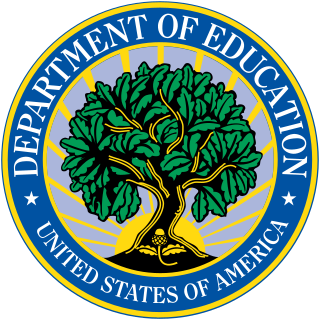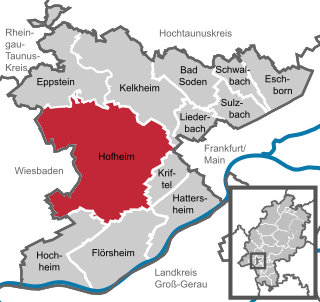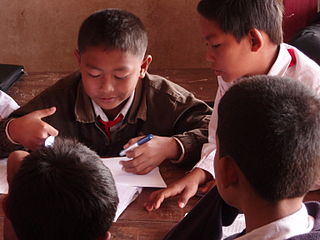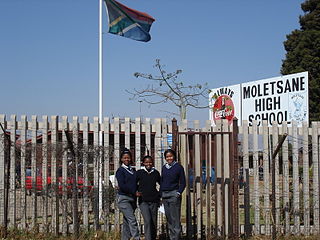
The United States Department of Education is a cabinet-level department of the United States government. It began operating on May 4, 1980, having been created after the Department of Health, Education, and Welfare was split into the Department of Education and the Department of Health and Human Services by the Department of Education Organization Act, which President Jimmy Carter signed into law on October 17, 1979.

The Inner London Education Authority (ILEA) was the local education authority for the City of London and the 12 Inner London boroughs from 1965 until its abolition in 1990. From 1965 to 1986 it was an ad hoc committee of the Greater London Council; on 1 April 1986 it was reconstituted as a directly elected body corporate.

Hofheim is the administrative centre of Main-Taunus-Kreis district, in the south of the German state of Hesse. Its population in September 2020 was 39,946.
Education in Malaysia is overseen by the Ministry of Education. Although education is the responsibility of the Federal Government, each state and federal territory has an Education Department to co-ordinate educational matters in its territory. The main legislation governing education is the Education Act 1996.

The Judd School is an 11–18 voluntary aided, grammar school and sixth form in Tonbridge, Kent, England. It was established in 1888 at Stafford House on East Street in Tonbridge, where it remained for eight years before moving to its present location on Brook Street, in the south of the town. Founded by the Worshipful Company of Skinners, it was named after 16th century merchant Sir Andrew Judde, whose endowment helped fund the school. The Skinners' Company maintains close links with the school and makes up the majority of the governing body.
Dhidhdhoo is the capital of Haa Alif Atoll in the Maldives. Ranked the 2nd most populated island in the north of Maldives after Kulhudhuffushi City. Located in the center of the atoll, Dhidhdhoo is governed by Dhidhdhoo Island Council under the Local Government Authority. This island is famous for having the least crime rates amongst the 10 most populated islands in the nation consecutively for a number of years.
The Board of Secondary Education, Assam commonly known as SEBA, was the state education regulatory board under the jurisdiction of Ministry of Education, Government of Assam for conducting examinations and providing assurance for the quality of education imparted in schools within Assam, India that are affiliated to it. It offers education in Bodo, English (IL), Assamese, Bengali, Hindi, Meitei (Manipuri), Hmar, Nepali, Mizo, Khasi, Garo, Karbi and Urdu languages.

Bishop Allen Academy; officially known as Bishop Allen Academy Catholic Secondary School, is a high school in Toronto, Ontario, Canada managed by the Toronto Catholic District School Board, formerly the Metropolitan Separate School Board. It is one of the board's 31 secondary schools and houses about 1643 students as of the 2017-18. The school building opened in 1963 as Kingsmill Secondary School (1963-1988) by the Etobicoke Board of Education, which later became the Toronto District School Board, and has leased the campus to the MSSB/TCDSB since 1989. It is located in the Queensway – Humber Bay neighbourhood of Etobicoke.

French International School "Victor Segalen" of Hong Kong is a French international school in Hong Kong. It is the only accredited French school in Hong Kong (linked by an agreement with the Agency for French Teaching Abroad. It has over 2,500 students in four different campuses. Since September 2014, FIS expanded its operations to a new campus in Hung Hom. In September 2018, the FIS opened its new campus in Tseung Kwan O, closing the Hung Hom Campus.

In 2005, the literacy rate in Laos was estimated to be 73%.

King Edward VI Academy is a coeducational bi-lateral secondary school and sixth form with academy status, located in Spilsby, Lincolnshire, England, for children between the ages of eleven and eighteen.

Education in Uruguay is compulsory for a total of fourteen years, beginning at the preschool level, and is free from the pre-primary through the university level. In 1996, the gross primary enrollment rate was 111.7 percent, and the net primary enrollment rate was 92.9 percent. Primary school attendance rates were unavailable for Uruguay as of 2001.
Education in Montserrat is compulsory for children between the ages of 5 and 14, and free up to the age of 17. The Government of Montserrat developed an Education in the Country Policy Plan for 1998–2002 in conjunction with the United Kingdom. Under this plan, the government is supporting initiatives in the areas of curriculum development, student assessment and evaluation, professional development for teachers, post-secondary education expansion, and educational infrastructure and information technology.
R. M. Veerappan, also referred to as RMV or Rama Veerappan, was an Indian film producer, screenwriter and politician from the Indian state of Tamil Nadu. He was the founder and leader of the MGR Kazhagam party. He served as a Cabinet Minister in five governments from 1977 to 1996, was a three-time Member of Legislative Council and a two-time Member of the Legislative Assembly. He was the Leader of the House for Legislative Assembly and Leader of ADMK party of the Legislative Council. He was the architect behind the ADMK organization, unified the MGR fan clubs for the party formation. He was called as the 'Chanakya' of AIADMK politics in the 70's and 80's.
Dhuvaafaru is an inhabited island of Maldives located in the eastern edge of Raa Atoll. Resettlement of the island started on 14 December 2008 to inhabit the displaced residents of Kandholhudhoo who were the victims of the 2004 Indian Ocean earthquake and tsunami.

Kingsmill Secondary School, originally known as Kingsmill Vocational School is a Toronto District School Board building that existed as a public and vocational high school existed from 1963 until its closure in June 1988 run by the Etobicoke Board of Education. The school property as of 2024, remains under TDSB possession. This school was the first vocational school built in Etobicoke. Its motto was “ Industry. Integrity.”

Moletsane High School is a government secondary school in Soweto, South Africa. Founded in 1972 it became a secondary school in 1976. Students from the school were involved in the Soweto Uprising in 1976. The school's public/private partnership and the school's improvements in its results were praised by the South African Minister for Education.
The Pittwater House School, commonly called Pittwater House, is an independent secular co-educational Pre-Kindy, primary and secondary day school, located in Collaroy, on the Northern Beaches of Sydney, New South Wales, Australia. The school is relatively unique in providing single-sex education to both boys and girls in both primary and secondary school settings, on the one co-educational campus.
The Solomon Mahlangu Freedom College (SOMAFCO), was an educational institution established by the exiled African National Congress (ANC) in 1978 at Mazimbu, Tanzania. It provided primary and secondary education to students who had fled South Africa after the 1976 Soweto uprising or who were the children of existing exiles. It taught both academic and vocational subjects, unlike the Bantu education system that hosted black students in South Africa. Farmlands supplied food to the institution and it also included a hospital. It was officially opened by Oliver Tambo in 1985.
The federal government of the United States has limited authority to act on education, and education policy serves to support the education systems of state and local governments through funding and regulation of elementary, secondary, and post-secondary education. The Department of Education serves as the primary government organization responsible for enacting federal education policy in the United States.












